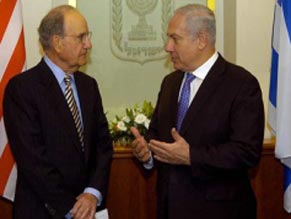|
World Jewish News

Photo by Moshe Milner / GPO
|
Netanyahu meets Mitchell for second round of proximity peace talks
20.05.2010, Israel and the World Prime Minister Benjamin Netanyahu met Thursday with the United States' special envoy to the Middle East, George Mitchell, for a second round of indirect peace negotiations with the Palestinians.
Defense Minister Ehud Barak and Netanyahu's adviser, attorney Yitzhak Molho, also took part in the meeting.
Mitchell arrived in the region on Tuesday and has already held talks with Palestinian President Mahmoud Abbas. During their meeting on Wednesday, Mitchell and Abbas discussed possible outlines of a future Palestinian state.
We are focusing on final-status issues like borders and security," Saeb Erekat told reporters after that meeting.
"We hope that in the next four months we can achieve the two-state solution on the 1967 borders," said Erekat, reiterating a Palestinian demand that Israel withdraws from Palestinian territory it captured in the 1967 Middle East war.
Mitchell will shuttle between Israel and the West Bank for the second substantive sessions since the Palestinians agreed to the indirect "proximity" talks, which have been given a maximum of four months to produce results.
Israeli leaders have said the Palestinians can raise core issues like the status of Jerusalem, final borders and the issue of Palestinian refugees in the indirect talks, but only direct negotiations can resolve them.
Palestinians say they could hold direct talks if Israel halts all settlement activities on occupied land.
Netanyahu said this week his government "is prepared to do things that are not simple, that are difficult".
Government sources said Netanyahu is favorably examining a proposal to expropriate land from Jewish settlers in the occupied West Bank to build a road between Ramallah and a new Palestinian town under construction.
Abbas broke with tradition on Monday by failing to give a speech on the day that Palestinians mourn the creation of Israel, which they call the "nakba", or catastrophe. Analysts said he wanted to avoid an occasion in which he would be expected to condemn Israel in strong language.
The White House has said it will hold either side accountable for any action that could undermine negotiations.
The pledge appeared in part aimed at satisfying Abbas' fears that Israel's right-leaning government might announce further expansion of Jewish housing in and around Jerusalem.
Obama also urged Abbas to do all he can to prevent acts of incitement or delegitimization of Israel.
Israel captured East Jerusalem along with the West Bank and Gaza Strip in 1967, and considers all of Jerusalem its capital, a claim that is not recognized internationally.
Palestinians want East Jerusalem as the capital of the state they intend to establish in the West Bank and Gaza Strip.
Direct peace talks were suspended in late 2008.
Haaretz.com
|
|
